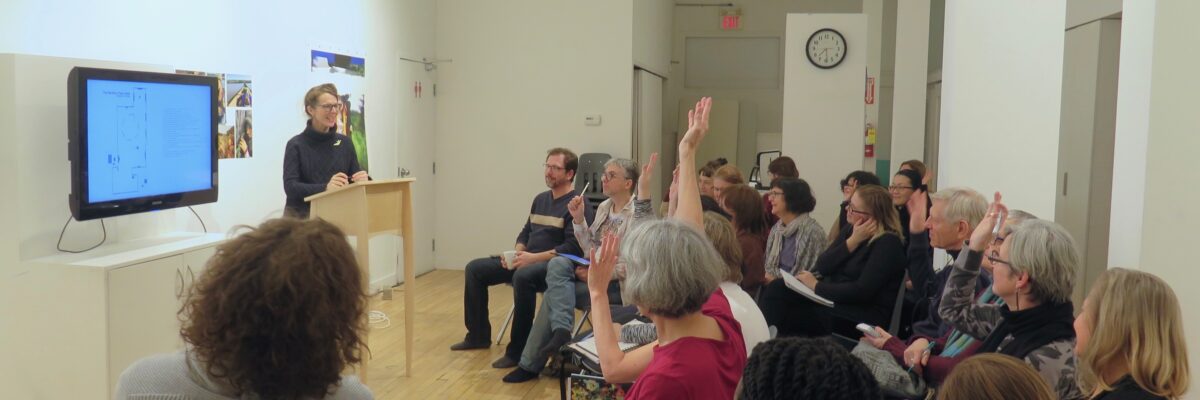Professional Advice

hannah_g leads a workshop at MAWA
The professional practices tools included here reflect the Canadian art scene, and its granting and gallery systems. They also provide advice on ways to diversify income, carve out focused studio time, and contextualize your work.
Making great art is only the first step. You also need to promote yourself and advocate for yourself. In short, you need to put yourself out there.
On this site you will find advice from art professionals who share their experience in video tutorials. There are also information pages that provide answers to frequently asked questions. All resources are designed to help you advance your career and be your most successful artist-self.
Grantwriting
Canadian society values art and artists. Whether you are an emerging or established artist, you are eligible for public funding. It is your right to apply. Depending upon where you live, grants may be available from municipal and provincial arts councils, as well as the Canada Council for the Arts. Even though the Canada Council is the largest granting body and national, do not be intimidated! The success rate for individual artists is actually often higher at the national level than the municipal and provincial levels.
So, how does one write a grant? You need to have a project (what do you want to do?) and be able to articulate why you want to make it. You need an art resume. You need a realistic budget for its realization. Finally, you need support material (images of what have you made in the past) to show the style, proficiency and themes in your work. Support material needs to be in the digital format requested by the granting body.
Sound complicated? Fortunately, artist Yvette Cenerini breaks it all down for you in the following three videos to help you successfully apply for funding.
- Grantwriting Part 1: Project Proposals
- Grantwriting Part 2: Resumes, CVs and Bios
- Grantwriting Part 3: Budgets and Support Material
- Rédaction de demandes de subvention : Budgets et matériel de soutien avec Yvette Cenerini
- Rédaction de demandes de subvention : Propositions de projet et curriculum vitae avec Yvette Cenerini
Self-Employment/Finances
Diversifying your art income is a great way to fund your practice. As an artist you have valuable skills that you could monetize. Check out the following videos that are designed to help you expand your art-related income.
“I supported myself as an artist for twelve years, but the only way I could do that was by having diverse revenue streams. I applied for grants, exhibited, taught workshops, sold pieces, created multiples, gave talks, mentored, wrote grants for other people, wrote articles, curated … making a living meant keeping many balls in the air.”
– Shawna Dempsey
Self-Promotion
How do you get your work to an audience?
There are many aspects to self-promotion. They include using social media, having a web presence and the tried-and-true approach of meeting people and telling them about your work (networking). The following videos offer some strategies and approaches.
Once you have the interest of a curator or dealer, they may ask for more information about you. Or if you are showing your work at a local business, the public may want to know more about you and your art. It is important to have an updated art resume, biography and artist statement and to keep your artist website current. These are basic promotional tools that every artist should have.
Studio Visits
It is hard to get an exhibition if curators don’t know that you exist! If you feel like you are ready for a curator to come to your studio, see your work and give you feedback, call or write and invite one! Be sure that you are well prepared, so that you can present yourself and your artwork in the most professional, thoughtful way possible. The following video talks provide important insight about what to do and, as importantly, what not to do.
Exhibitions
Some galleries, particularly artist-run centres, accept exhibition proposals from artists. Are you ready for a solo show? Does your work make sense with the gallery’s mandate? Will it fit in the gallery’s space? Apply!
Once you have an exhibition booked, think about how you want to contextualize your work. Labels, wall signage and brochures are just a few ways you can deepen peoples’ understanding of your work. You may also want to ensure that the exhibit will be accessible for people living with disabilities. These videos will help you to examine ways to help your work connect with an audience.

